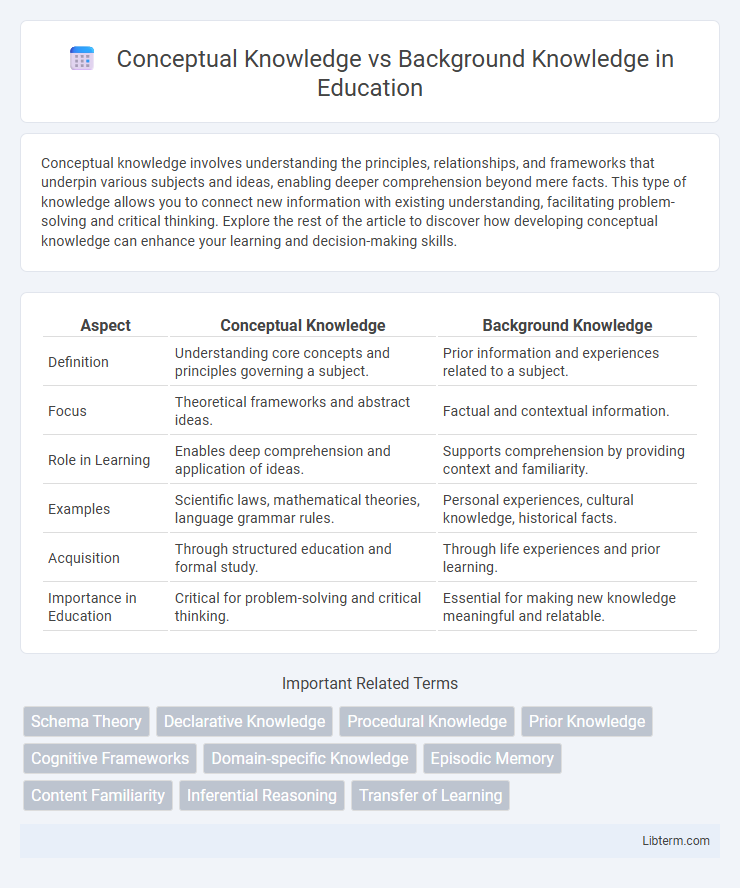Conceptual knowledge involves understanding the principles, relationships, and frameworks that underpin various subjects and ideas, enabling deeper comprehension beyond mere facts. This type of knowledge allows you to connect new information with existing understanding, facilitating problem-solving and critical thinking. Explore the rest of the article to discover how developing conceptual knowledge can enhance your learning and decision-making skills.
Table of Comparison
| Aspect | Conceptual Knowledge | Background Knowledge |
|---|---|---|
| Definition | Understanding core concepts and principles governing a subject. | Prior information and experiences related to a subject. |
| Focus | Theoretical frameworks and abstract ideas. | Factual and contextual information. |
| Role in Learning | Enables deep comprehension and application of ideas. | Supports comprehension by providing context and familiarity. |
| Examples | Scientific laws, mathematical theories, language grammar rules. | Personal experiences, cultural knowledge, historical facts. |
| Acquisition | Through structured education and formal study. | Through life experiences and prior learning. |
| Importance in Education | Critical for problem-solving and critical thinking. | Essential for making new knowledge meaningful and relatable. |
Understanding Conceptual Knowledge
Understanding conceptual knowledge involves grasping the fundamental principles and relationships that form the foundation of a subject, enabling deeper comprehension and application of information. It differs from background knowledge, which consists of prior experiences and facts that provide context but may not explain underlying concepts. Mastering conceptual knowledge enhances critical thinking and problem-solving by connecting abstract ideas to real-world scenarios.
Defining Background Knowledge
Background knowledge encompasses the information and experiences that individuals have accumulated over time, providing a contextual foundation for understanding new concepts. This type of knowledge includes prior facts, cultural norms, and situational awareness that aids in interpreting information accurately. It supports cognitive processes by enabling connections between existing understanding and new learning materials.
Key Differences Between Conceptual and Background Knowledge
Conceptual knowledge refers to an understanding of principles, theories, and models that explain how things work, while background knowledge consists of facts and information accumulated through experience or prior learning. Conceptual knowledge enables problem-solving and application in new contexts, whereas background knowledge supports comprehension and recognition based on familiarity. These key differences highlight that conceptual knowledge is abstract and transferable, whereas background knowledge is concrete and context-specific.
The Role of Conceptual Knowledge in Learning
Conceptual knowledge plays a critical role in learning by enabling learners to understand underlying principles and relationships within a subject, which supports deeper comprehension and application of new information. This type of knowledge allows students to connect facts to broader frameworks, facilitating problem-solving and transfer of skills across contexts. Unlike background knowledge, which provides context and familiarity, conceptual knowledge drives active learning and cognitive development by structuring information meaningfully.
Importance of Background Knowledge for Comprehension
Background knowledge plays a critical role in comprehension by providing the necessary context and framework for understanding new information. It enables readers to make inferences, recognize relationships, and decode meanings within texts more effectively than relying solely on conceptual knowledge. Research in cognitive psychology highlights that strong background knowledge significantly improves reading comprehension, vocabulary acquisition, and overall learning outcomes.
How Conceptual Knowledge Enhances Critical Thinking
Conceptual knowledge, which involves understanding principles, theories, and frameworks, enhances critical thinking by enabling individuals to analyze information more deeply and make connections between ideas. This type of knowledge helps in identifying underlying assumptions, evaluating arguments, and solving complex problems effectively. Unlike background knowledge, which is more about familiarity with facts and experiences, conceptual knowledge supports higher-order thinking and reasoning skills essential for critical analysis.
The Impact of Background Knowledge on Academic Success
Background knowledge significantly influences academic success by providing students with a foundation to understand new information and make connections across subjects. Research indicates that students with extensive background knowledge in a subject area demonstrate higher reading comprehension and problem-solving skills. Educational strategies that activate and build background knowledge enhance learning outcomes and support long-term retention.
Building Conceptual Knowledge in Education
Building conceptual knowledge in education involves structuring information around key ideas and principles to enhance deep understanding and facilitate critical thinking. Conceptual knowledge enables students to connect new information with existing cognitive frameworks, improving problem-solving and transfer of learning across subjects. Effective strategies include using visual models, analogies, and real-world applications to solidify abstract concepts and support long-term retention.
Strategies to Strengthen Background Knowledge
Strengthening background knowledge involves strategies such as activating prior knowledge through discussion, using multimedia resources to build context, and connecting new information to students' existing experiences. Employing graphic organizers and concept maps helps organize and relate background information effectively. Consistent exposure to diverse content and real-world examples further enhances comprehension and retention.
Integrating Conceptual and Background Knowledge for Deeper Learning
Integrating conceptual knowledge, which involves understanding abstract principles and frameworks, with background knowledge, the factual information and experiences stored in memory, enhances deeper learning by facilitating meaningful connections and context. This fusion enables learners to apply theoretical concepts to real-world situations effectively, promoting higher-order thinking and critical analysis. Educators can design curricula that embed background knowledge into conceptual teaching, thereby enriching comprehension and retention.
Conceptual Knowledge Infographic

 libterm.com
libterm.com